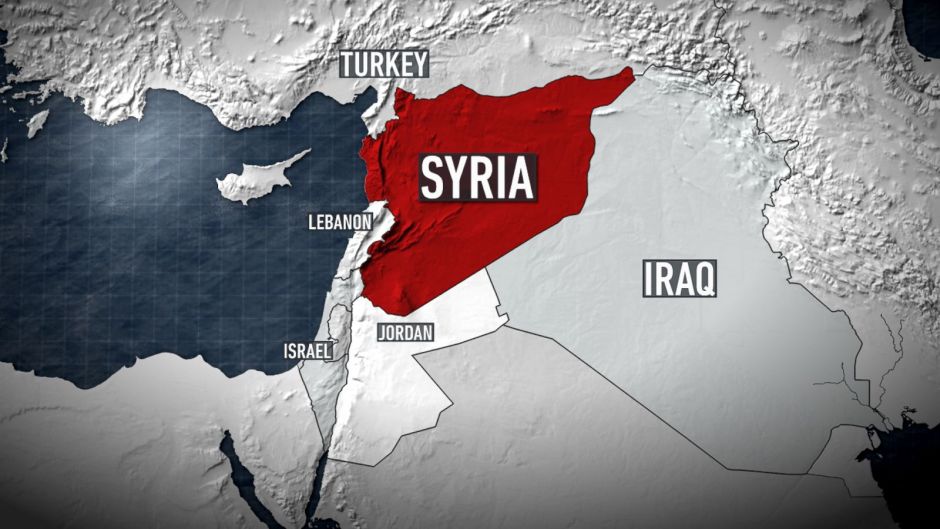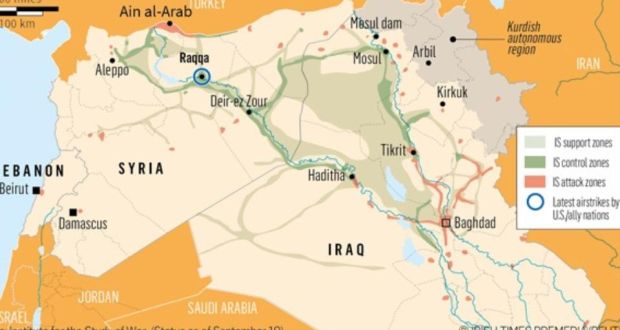The latest phase in the global armed struggle against Islamic State, an Al Qaeda breakaway organization that has wreaked havoc in the Middle East, has begun with a flash of shock and awe.
More than a month after bombing Islamic State strongholds in northern Iraq, the United States has opened a new front in the expanding war, striking Islamic State’s bases, command-and-control centers, check points and oil refineries in northern Syria. Two Al Qaeda affiliates, the Nusra Front and Khorasan, were also struck.
Participating in the strikes were five U.S. Arab allies: Saudi Arabia, Jordan, Qatar, Bahrain and the United Arab Emirates.
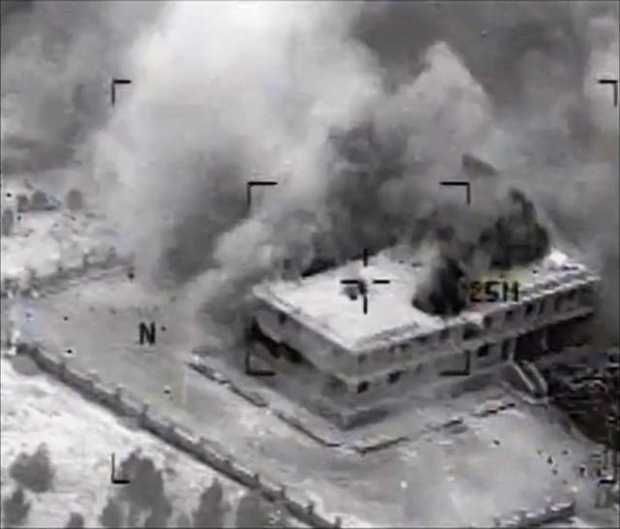
The raids, the heaviest of the air war to date, were carried out by fighter jets, drones and Tomahawk cruise missiles fired from American ships in the Red Sea and the Persian Gulf.
One of the main targets was the Syrian city of Raqqa, which Islamic State has held for close to a year and which has become its de facto capital. Oil refineries were targeted because Islamic State sells petroleum on the black market to help finance its operations.
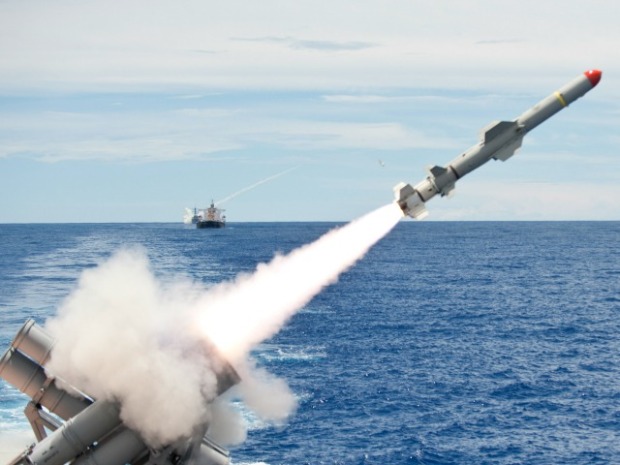
The decision to use air power against Sunni extremists is an explicit acknowledgement by the United States that Islamic State has already gone too far and must be stopped before it’s too late.
Since 2013, Islamic State fighters — recruited from the Muslim world and abroad — have captured vast swaths of territory in Syria and Iraq in a bid to create a borderless and fundamentalist Sunni Muslim caliphate in the Middle East.
During its barbaric rampage, Islamic State has imposed Shariah law on the inhabitants under its sway, harassed, persecuted, exiled and killed members of religious minorities, forced Christians to convert to Islam, blown up or desecrated several historic churches and destroyed numerous Shiite shrines.
All in the name of creating an austere, puritanical and retrogressive Islamic order in the region.
And in retaliation for the bombing of its facilities in Iraq, Islamic State has beheaded two American journalists and one British aid worker.
The air campaign in Syria — which has been embroiled in a civil war for the past three years — was launched without the permission of the Syrian government. According to reports, Syrian President Bashar al-Assad was informed of the bombings in advance. Assad’s Baathist regime did not denounce them because they were aimed at jihadist groups that seek his overthrow. But Syria’s allies, Iran, Hezbollah and Russia, protested, calling the air strikes uncoordinated and illegal.
At this point, it’s too early to tell whether they will be of benefit to Assad’s regime, which the United States considers illegitimate and hopes to unseat.
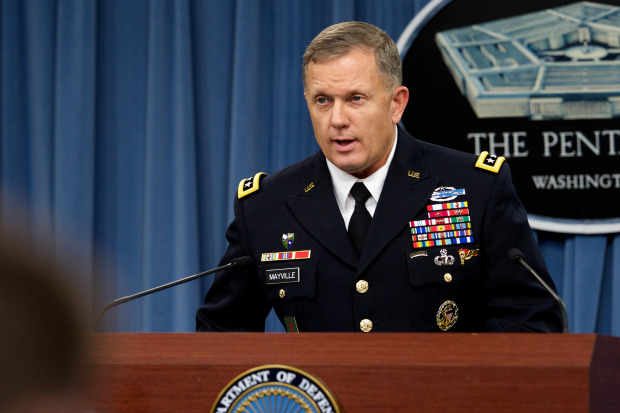
What’s clear, as U.S. President Barack Obama has warned, is that the current air campaign to uproot Islamic State and its smaller clones will be a lengthy one. The director of operations of the U.S. Joint Chiefs of Staff, Gen. William Mayville Jr., described it as the beginning of a “sustained” drive to degrade and destroy Islamic State.
With the launch of aerial bombardments in both Iraq and Syria, the United States and its allies are essentially buying time to train and equip Syrian and Iraqi ground troops. Since the United States has no intention of deploying its own soldiers to fight Islamic State, Washington is counting on local forces to do the job.
Shades of South Vietnam.
The fighters in Syria are supposed to come from the ranks of the moderate Syrian opposition, which is vastly outnumbered and outgunned by Islamic radicals. The Iraqi contingent will be drawn from the Kurdish community as well as from Sunni and Shiite Arab communities.
In Iraq, Kurdish pesh merga fighters, Shiite militias and the reconstituted Iraqi army, backed by pinpoint U.S. air strikes, have made some progress in rolling back Islamic State. Nonetheless, Islamic State still controls most of the areas it has conquered since January of this year, including the city of Mosul.
It remains to be seen whether Syrian forces will be up to the task once they’ve been properly trained. Supposedly, they won’t be in fighting form until 2015. In the meantime, Islamic State will try to consolidate its gains.
Everyone agrees that Islamic State cannot be defeated by air power alone. Boots on the ground are absolutely required. In Iraq, U.S. air strikes stopped Islamic State’s offensive on Baghdad and enabled Iraqi fighters to recapture Iraq’s biggest dam. Yet Islamic State is still a formidable force.
In addition to making use of regional forces to combat Islamic State, the Obama administration’s strategy turns on draining its financial resources and halting the flow of its foreign recruits to Syria and Iraq. Two days ago, the United Nations’ Security Council unanimously passed a resolution requiring UN member states to pass laws banning its citizens from joining terrorist groups.
The big unanswered question at this juncture is whether American-trained and equipped ground forces, particularly in Syria, will necessarily do the bidding of the United States. The chief objective of Syrian opposition leaders from moderate factions is to topple Assad. Accordingly, they’ve called on the United States to establish no-fly zones in Syria and supply their fighters with Manpads capable of shooting down Syrian aircraft. For the moment, however, the United States’ chief priority is the destruction of Islamic State, not the replacement of Assad’s regime.
The situation in Iraq is complicated as well. Iraqi Shiite militias tend to be pro-Iranian and anti-American. Given this reality, how far should the United States go to build up a military bulwark against Islamic State? And then there’s the Kurdish problem. If the Kurds are instrumental in defeating Islamic State, they may well demand a Kurdish state in return. Iraq would oppose this, as would neighboring states like Iran, Syria and Turkey.
Turkey, a U.S. ally and the sole Muslim member of the NATO alliance, has an intrinsic interest in the obliteration of Islamic State. Now that 49 Turkish hostages held in Mosul have been released by Islamic State, Turkey’s president, Recep Tayyip Erdogan, has vaguely promised to provide “necessary support” to defeat Islamic State.
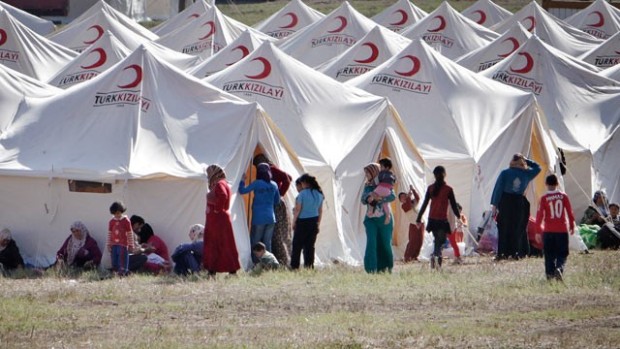
Turkey — which permitted thousands of foreign fighters to cross into Syria from its border — is already playing a key humanitarian role in tending to the needs of hundreds of thousands of Syrian refugees in Turkish tent camps. But is Turkey prepared to allow U.S. combat jets to use its airfields to attack Islamic State in Syria?
John Kerry, the American secretary of state, believes that Turkey is ready to make “additional efforts” as a partner in the international coalition arrayed against Islamic State.
Time will tell.
